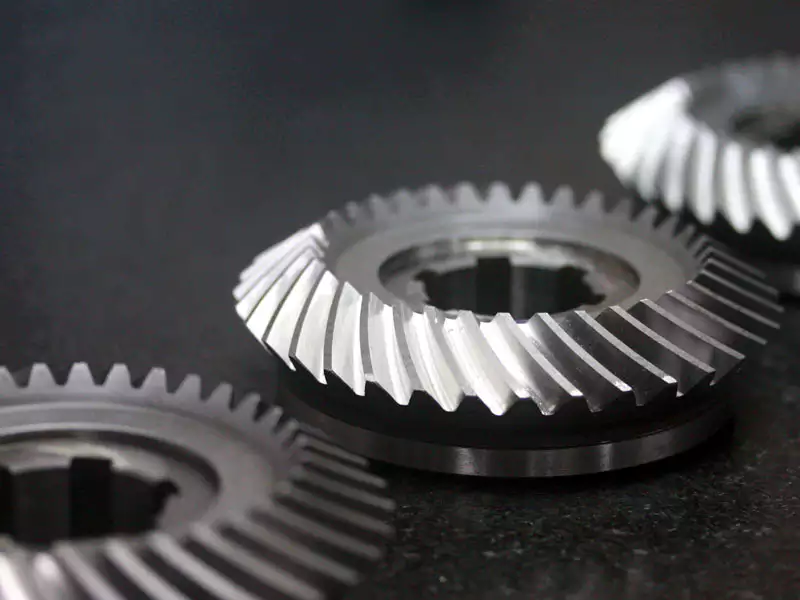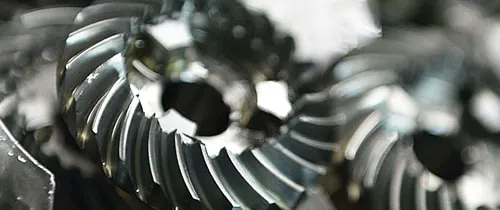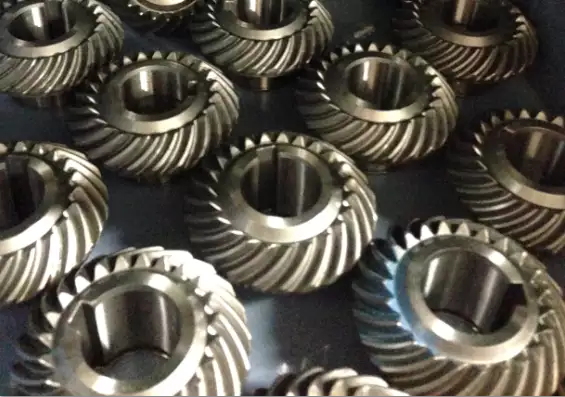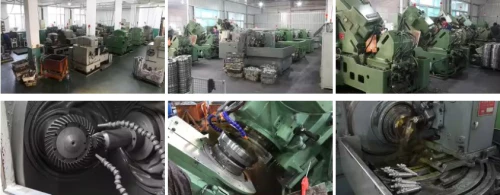Introduction
Bevel gears are integral components in mechanical systems, widely used for transmitting power and motion between shafts that are oriented at an angle to each other, typically 90 degrees. As industries continue to evolve, the design and application of bevel gears are also advancing. This article explores the current trends in bevel gear engineering, focusing on innovations, materials, and applications, with a particular emphasis on spiral bevel gear design. Additionally, we will highlight the significance of these trends in various industries, including examples from Argentina and its surrounding regions.
Overview of Bevel Gears
Bevel gears are integral components in mechanical systems, specifically designed to efficiently transfer motion and power between shafts that are oriented at various angles, typically 90 degrees. This unique configuration enables bevel gears to play a crucial role in a wide array of applications, from automotive drivetrains to aerospace machinery. Their ability to alter the direction of rotational motion while maintaining efficiency is a significant advantage, allowing for flexible designs in complex systems.
Among the various types of bevel gears, two primary categories stand out: straight bevel gears and spiral bevel gears. Each type has distinct characteristics that make them suitable for different applications, influenced by factors such as load capacity, operational speed, and noise considerations.
Types of Bevel Gears
- Straight Bevel Gears: Straight bevel gears are characterized by their straight teeth, which align with the axis of the gear. These gears are primarily utilized in applications that require speed reduction and torque multiplication. They are straightforward in design and easy to manufacture, making them cost-effective solutions for many industrial applications. However, their engagement can produce more noise and vibrations, particularly at high speeds, which may limit their use in sensitive environments. Straight bevel gears are commonly found in applications such as conveyor systems, automotive differentials, and power transmission systems where simplicity and reliability are paramount.
- Spiral Bevel Gears: Spiral bevel gears feature teeth that are cut at an angle to the gear axis, allowing for more gradual engagement between the gear teeth. This design significantly reduces noise and vibration, making spiral bevel gears ideal for high-speed applications where smooth operation is essential. Their unique tooth geometry also enables them to handle higher loads compared to straight bevel gears, making them a preferred choice in demanding applications such as automotive engines, aerospace gearboxes, and industrial machinery. The efficiency of spiral bevel gears contributes to their widespread use in systems requiring precise motion control and minimal backlash.
- Hypoid Gears: Hypoid gears represent a specialized subset of bevel gears that allow for offset shafts, meaning the axes of the two gears do not intersect. This configuration enables a smooth operation similar to that of spiral bevel gears but with the added advantage of higher torque capacity. Hypoid gears are particularly beneficial in applications that require high power transmission, such as in automotive differentials and heavy machinery. Their design allows for greater flexibility in layout, enabling engineers to create compact systems without sacrificing performance. The ability to handle significant loads while minimizing friction makes hypoid gears essential in various industrial applications.
In summary, bevel gears, including straight, spiral, and hypoid types, are vital components in many engineering applications. Their ability to transfer power efficiently between shafts at different angles allows for innovative designs in mechanical systems across diverse industries. Understanding the characteristics and applications of each type of bevel gear is crucial for engineers and designers seeking to optimize performance in their specific fields.
Current Trends in Bevel Gear Design
Advancements in Materials
Recent advancements in materials science have led to the development of high-strength alloys and composites used in the production of bevel gears. These materials enhance durability, reduce weight, and improve performance under high-stress conditions. For instance, in the automotive industry, companies in Buenos Aires are increasingly using these advanced materials to produce spiral bevel gears that can withstand the demanding conditions of modern engines.
Manufacturing Innovations
Innovations in manufacturing technologies, such as 3D printing and precision machining, are revolutionizing bevel gear production. 3D printing allows for rapid prototyping and customization of gear designs, significantly reducing lead times. Precision machining techniques ensure tighter tolerances and improved performance. This is particularly beneficial for industries in cities like Córdoba, where customized solutions are often required to meet specific engineering challenges.
Customization and Modularity
There is a growing trend towards customization in bevel gear design. Engineers are increasingly seeking tailor-made solutions that meet the unique requirements of their applications. Modular gear systems are also gaining popularity, allowing for interchangeable components that can be easily replaced or upgraded. This flexibility is essential for industries in Rosario and Mendoza, where operational efficiency is critical.

Technological Integration
Digital Twins and Simulation
The use of digital twins and simulation software is transforming how engineers design and optimize bevel gears. By creating a virtual representation of the gear system, engineers can analyze performance under various conditions and make informed adjustments to the design. This technology is particularly beneficial for manufacturers in Buenos Aires looking to enhance the reliability of their spiral bevel gears.
Smart Gear Systems
The integration of IoT technology in gear systems is on the rise. Smart gear systems equipped with sensors can monitor performance metrics such as load, temperature, and vibration in real-time. This data allows for predictive maintenance, reducing downtime and extending the lifespan of gear systems. Companies in the agricultural sector around Santa Fe are utilizing these innovations to improve machinery efficiency.
Sustainability Considerations
The increasing emphasis on sustainability is significantly reshaping the landscape of bevel gear manufacturing. As industries become more aware of their environmental footprint, there is a concerted effort to explore eco-friendly materials and innovative production processes that reduce waste and energy consumption. This shift is not just a trend but a necessary evolution in manufacturing, as companies recognize their role in combating climate change and promoting responsible resource use.
In the quest for sustainability, many manufacturers are turning to alternative materials that have a lower environmental impact. For instance, the use of recycled metals in the production of bevel gears is gaining traction. These materials not only reduce the demand for virgin resources but also lower the overall energy required for manufacturing. Furthermore, advancements in technology allow for more efficient machining processes that minimize waste and emissions during production.
Energy-efficient designs are also becoming a critical focus in the development of bevel gears. By optimizing gear geometry and material selection, manufacturers can create products that operate more efficiently, thereby reducing energy consumption during use. This is particularly important in sectors such as automotive and aerospace, where energy efficiency can lead to significant reductions in fuel consumption and emissions. For example, in cities like La Plata, where the manufacturing sector is actively seeking to improve its sustainability credentials, adopting energy-efficient bevel gear designs is seen as a practical way to contribute to a greener economy.
Additionally, companies are increasingly incorporating sustainability into their operational practices. This includes adopting cleaner energy sources for manufacturing facilities, implementing waste reduction programs, and investing in technologies that enhance recycling capabilities. The commitment to sustainability reflects a broader industry trend towards environmental responsibility, where manufacturers not only comply with regulations but actively strive to exceed them.
In summary, the push for sustainability is profoundly influencing bevel gear manufacturing, leading to the adoption of eco-friendly materials, energy-efficient designs, and responsible production practices. As cities like La Plata embrace these changes, manufacturers are paving the way for a more sustainable future, demonstrating that economic success and environmental stewardship can go hand in hand.

Industry Applications
Bevel gears are prevalent across various sectors, each benefiting from the latest trends in gear design and manufacturing.
- Automotive Industry: In the automotive sector, particularly in Buenos Aires, spiral bevel gears are essential for drivetrain systems, ensuring efficient power transfer and enhancing vehicle performance.
- Aerospace: The aerospace industry demands high-performance bevel gears that can withstand extreme conditions. Companies in Cordoba are at the forefront of developing specialized bevel gears for aircraft applications.
- Robotics: In robotics, bevel gears play a crucial role in enabling precise movements. With the rise of automation in Mendoza, the demand for custom bevel gears is increasing.
- Renewable Energy: Bevel gears are vital in wind turbines, where they help convert rotational energy. The renewable energy sector in Argentina is expanding, driving the need for innovative gear solutions.
Challenges and Future Directions
Despite significant advancements in bevel gear design and manufacturing, several challenges persist that engineers must navigate. One of the primary issues is cost constraints, as the demand for high-quality, precision components often drives up production expenses. Manufacturers must balance the need for affordability with the requirements for superior performance, which can be particularly challenging in competitive markets.
Precision requirements pose another significant challenge. Bevel gears must be designed and manufactured with extremely tight tolerances to ensure optimal performance. Even minor deviations can lead to inefficiencies, increased wear, and potential failure. Meeting these precision standards necessitates advanced manufacturing techniques and rigorous quality control measures, which can be resource-intensive.
Material limitations also present hurdles in the bevel gear industry. While advancements in materials science have introduced new options, not all materials are suitable for every application. Engineers must carefully select materials that can withstand specific loads, environmental conditions, and operational stresses while also considering factors like weight and cost. The search for innovative materials that combine strength, durability, and lightweight properties is ongoing.
Looking to the future, the outlook for bevel gear manufacturing is promising. Ongoing research and development efforts are focused on addressing these challenges head-on. One of the most exciting trends is the integration of artificial intelligence (AI) and automation into manufacturing processes. By leveraging AI, manufacturers can optimize production workflows, enhance precision, and reduce waste, leading to more efficient and cost-effective operations.
Moreover, automation technologies are being employed to improve consistency and accuracy in manufacturing. Automated machining processes can ensure that each component meets the required specifications, minimizing the risk of human error and enhancing overall product quality. As these technologies continue to evolve, they are expected to revolutionize bevel gear production, making it faster, more flexible, and economically viable.
In conclusion, while challenges such as cost constraints, precision requirements, and material limitations remain, the future of bevel gear manufacturing is bright. With ongoing research, technological advancements, and a commitment to innovation, the industry is poised to overcome these obstacles and deliver high-quality products that meet the demands of various applications. As we move forward, the integration of AI and automation will play a pivotal role in enhancing the efficiency and effectiveness of bevel gear production, setting the stage for a new era in engineering excellence.

Conclusion
In summary, the trends in bevel gear engineering reflect a dynamic landscape driven by technological advancements, material innovations, and customization needs. As industries continue to evolve, staying updated with these trends is crucial for engineers and manufacturers involved in gear design.
At Tebsa, our Argentina-based company specializes in producing high-quality bevel gears, including spiral bevel gears. We are committed to providing our customers with the best solutions tailored to their specific needs. Here are some advantages of our products:
- High-Quality Materials: We utilize advanced materials that enhance the durability and performance of our bevel gears, ensuring they can withstand demanding applications.
- Precision Manufacturing: Our state-of-the-art manufacturing processes guarantee tight tolerances and high accuracy, which are essential for optimal gear performance.
- Customization Options: We offer a wide range of customization options to meet the specific requirements of our clients, enabling us to provide tailored solutions for any project.
- Expert Engineering Support: Our team of experienced engineers is available to assist customers in selecting the right bevel gear solutions for their applications, ensuring optimal performance.
- Reliable After-Sales Service: We pride ourselves on our excellent after-sales support, ensuring that our customers receive ongoing assistance and guidance even after their purchase.
By choosing Tebsa, you can trust that you are partnering with a reliable manufacturer dedicated to delivering the best bevel gear solutions in Argentina and beyond. Contact us today to learn more about how we can support your engineering needs!
